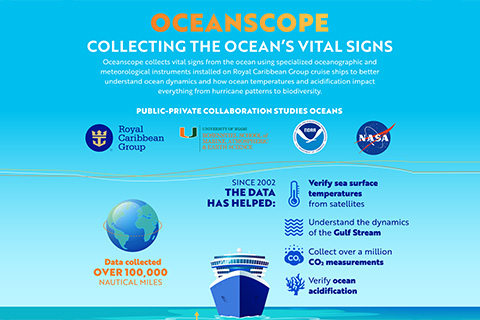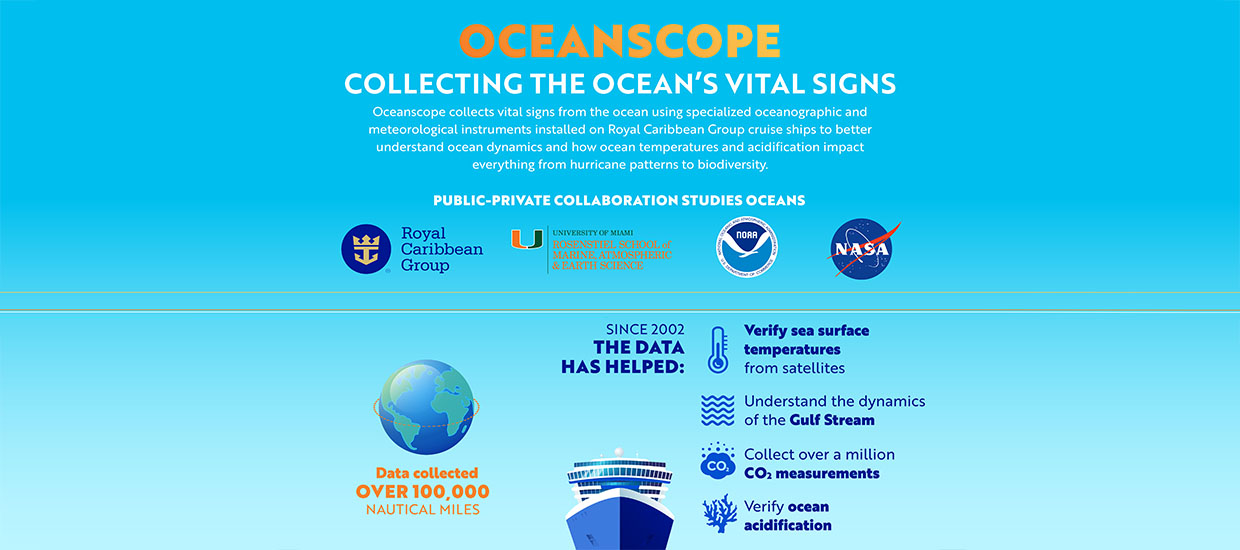
Ocean Laboratory on Explorer of the Seas.
The innovative research laboratories onboard Royal Caribbean’s Explorer of the Seas were the result of both a pioneering vision and hard work. The project was born in 1999 during a simple discussion about ocean-going research vessels between then-president of Royal Caribbean International Jack Williams and the former dean of the University of Miami Rosenstiel School of Marine and Atmospheric Science Dr. Otis Brown. Their “what if” discussion has transformed into the first-ever working research laboratories with associated educational activities onboard a cruise ship. Today, research vessels are seen as ideal scientific platforms for oceanographic research.
Together with marine operations experts at the UM Rosenstiel School, Mr. Harri Kulovaara, senior vice president of operations and his colleagues at Royal Caribbean brought to life the idea of cutting–edge science labs and educational venues on Royal Caribbean's Explorer of the Seas as the ship was being constructed in Kværner Masa-Yards, Turku, Finland.
The resulting Explorer of the Seas' Oceanlab Program offered an innovative solution to collect scientific information on changes in the ocean and atmosphere along the same continuous ship path over time.
Colleagues at the National Oceanic and Atmospheric Administration’s Atlantic Oceanographic and Meteorological Laboratory (NOAA/AOML) recognized the unprecedented opportunity and spearheaded the agency’s involvement to became a major player in equipping the ship and conducting ongoing research. The National Science Foundation provided critical funding for laboratory instrumentation. Since its initial installation, the National Aeronautics and Space Agency (NASA) and the Office of Naval Research (ONR) became partners in the endeavor and contributed funding, expertise, and creative energy to the original program.
On October 28, 2000, the realization of the laboratories and the Oceanlab program came to fruition with the maiden voyage of Explorer of the Seas.
An integrated science education and outreach component was a novel addition to the science program. The onboard technical staff and weekly visiting scientists offered multiple tours, feature films and lectures to cruise ship guests, offering them a unique look into the dynamic ocean world they are traveling through. Two “Eco-Learning Centers” on deck provide passengers with hands-on displays, access to real-time environmental data, and an opportunity to explore marine science through interactive touch-screen kiosks. From 2000 to 2007, over 90,000 guests sailing on Explorer of the Seas toured the laboratories and had the opportunity to interact directly with marine research scientists.

Otis Brown, past dean of the University of Miami Rosenstiel School of Marine and Atmospheric Science (Left) and Jack Williams, former president of Royal Caribbean International (Right).
In addition to measurements taken along the ship’s track, scientists from UM’s Rosenstiel School, NOAA and other institutions around the globe have conducted additional research aboard the ship – from tracking of dust particles from Africa across the Atlantic, to examining how
sea surface temperature compares to similar measurement obtained from earth-orbiting satellites. Using two state-of-the-art Acoustic Doppler Current Profilers (ADCP) mounted on the hull of the ship, scientists measure current flow beneath the ship. When combined with measurements of seawater temperature, these data contribute to the understanding of how heat is transported and balanced on the planet. The ADCP instruments are also used to study important, but often difficult to measure, populations of organisms living in the deep sea.
In this age of limited resources and growing information needs, the UM Rosenstiel School’s labs aboard Explorer of the Seas continues to stand out as a model of innovative collaboration between industry, academia, and government. With its expertise and state-of-the-art technology, the UM Rosenstiel School along with Royal Caribbean and their government partners invented a new paradigm for conducting ocean science.







